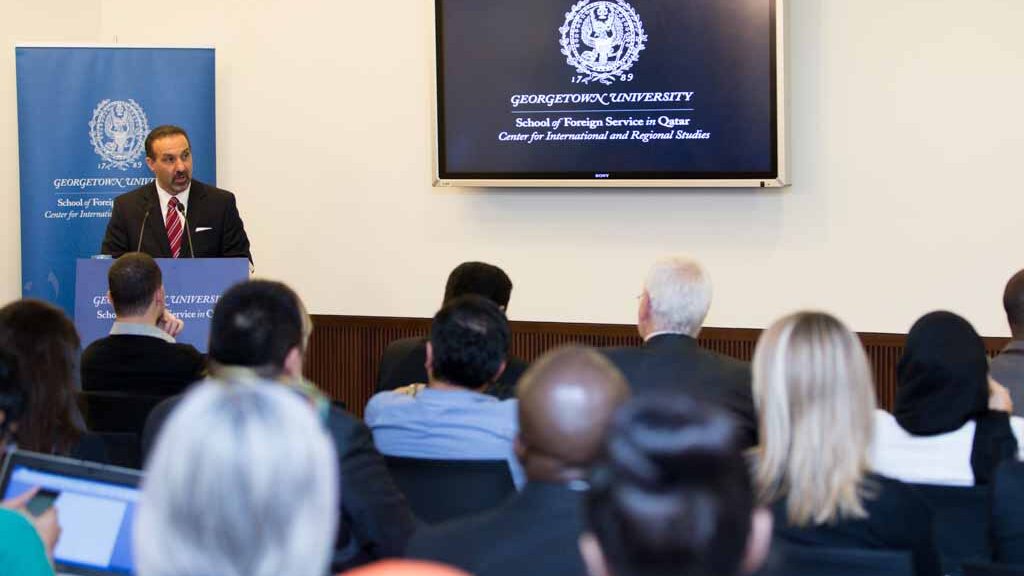Georgetown University Qatar Hosts Public Lecture: “From Revolution to Coup: Egypt and the Muslim Brotherhood”

The Center for International and Regional Studies (CIRS) at Georgetown University Qatar (GU-Q) recently hosted a public lecture titled “From Revolution to Coup: Egypt and the Muslim Brotherhood“, as a part of its Monthly Dialogue Series held on its Education City campus.
In the lecture, Dr.Al-Arian, an assistant professor of history at GU-Q, traced the trajectory of the Muslim Brotherhood in Egypt over the last three decades leading up to the removal of President Hosni Mubarak from power. He evaluated how that history, which followed the path of a reformist movement, rather than a revolutionary one, shaped their political performance over the last three years, and ended in a reversal of political fortune. He then discussed what reactions might be expected in the future, in light of a saga that continues to unfold in daily headlines.
“The tremendous global interest in these events is a testament to the importance of Egypt and the outcomes of the uprising.” began Dr. Al-Arian to an audience of students, faculty, and visitors from Education City and the Doha community. “We know that whatever happens in Egypt has a tremendous impact on the Middle East, including having consequences on the outcomes of other uprisings in the region.”
Despite the Brotherhood’s 85 year history, the presentation focused on the context of the MB in a post-Sadat Egypt, where economic liberalization had given rise to an urbanized, professional, increasingly religiously devout middle class, that added to the ranks of the Muslim Brotherhood, in addition to the traditional rural base that constituted the bulk of their numbers prior to this period.
“This new support base still deferred the ideology of the MB to their foundational predecessors, but streamlined the modes of delivery of the MB to appeal to Egyptians in a time where we see a fragmented Islamic identity, and when there are many more competitors in the arena of groups identifying as “Islamic”, including the state itself.” said Dr. Al-Arian.
As a result of this shift towards increased social engagement, the MB sought ways to accommodate the state while espousing gradual change, versus revolting against it. “More recently, we see the leadership of the MB choosing not to align itself with other opposition groups, and instead focusing on a narrow opposition to Mubarak’s regime.”
Following the democratic elections that put Morsi and the Brotherhood at the helm, the MB continued to hedge their bets, avoiding all out confrontation. But it became increasingly clear that despite the removal of Mubarak from power, the vast majority of the former regime’s political apparatus remained firmly entrenched. As a result, argued Dr. Al-Arian, the MB had no access to substantive ways to address the systems in place, and eventually were overturned.
The current and ongoing crackdown on the Muslim Brotherhood has driven the group back underground, which many say will only serve to empower them. But Al-Arian suggests that a now publically-functioning and engaged MB may not be able to flourish in the shadows in the way they survived before. ”The repression we see now is unprecedented. The military sees a popular mandate to extinguish the MB based on the discourse of the ‘war on terror’. Unlike in the past, where the state ‘turned a blind eye’, the regime is now dead-set on crushing the resistance.”
Instead, he argues, the result may produce the unintended consequence of enabling the development of opposition alternatives. “Maybe this will give rise to a ‘cosmopolitan Islamism’, a civic Islamic identity, not one caught between embittered Islamists versus the secular state, but one that includes all Egyptians working against the entrenched and repressive regime in a fight that is finally, a real revolution.”
Professor Al-Arian teaches introductory courses on the history of the Middle East, as well as advanced topics courses covering the history of modern Egypt, Islamic social movements, and Islamic law and society. His other forthcoming publications include “Answering the Call: Popular Islamic Activism in Egypt (1968-1981)”, and “Islam and Politics in North America”.